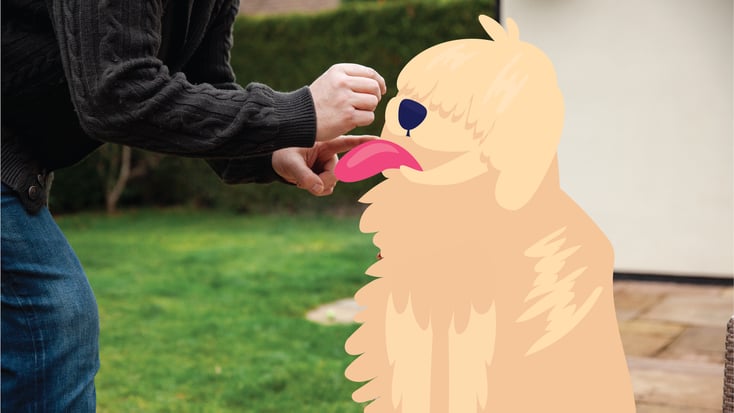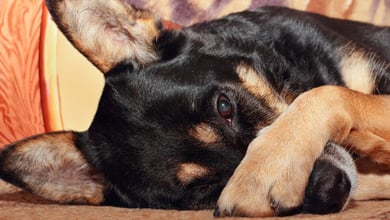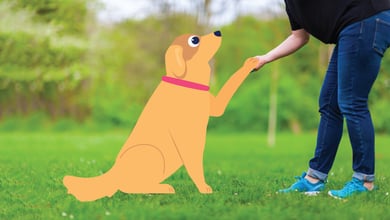Why Do Dogs Lick You? 5 Common Reasons

Have you ever found yourself pondering why your furry friend loves to shower you with wet, slobbery licks? You're not alone.
From showing affection to communicating their needs, a dog's licking behavior is a fascinating part of their interaction with humans.
So, why do dogs lick you? Let's find out...
Why Do Dogs Lick You?
Dogs lick you primarily to show affection, communicate needs, explore their surroundings, and for self-soothing purposes. Licking is rooted in their instincts and is a natural behavior, but if it becomes excessive, it's worth consulting a vet.
Here are the primary reasons your dog may lick you:
1. Affection
Just as humans might hug or kiss to show affection, dogs use licking as a way to express their love. This behavior can be traced back to their puppyhood when their mother would lick them to groom and show care. When your dog licks you, they might be trying to show you the same level of care and affection.
What is Your Pet’s Love Language?
1. How does your pet greet you when you come home?
2. What is your pet’s favorite reward?
3. Where would your pet choose to go?
4. If your pet could talk, what would they say to you?
View Results
2. Taste
Believe it or not, dogs might find the salty taste of human skin appealing. This could be because of the sweat and natural oils that our bodies produce. So, part of the reason your dog licks you could be because they simply like the taste!
3. Communication
Dogs have limited ways to communicate with humans, and licking is one of them. They might lick to show submission or to get your attention. In some cases, dogs might lick to indicate that they're hungry. If you notice your dog licks more frequently around feeding time, this might be the case.
Related Reading: Why Do Dogs Put Their Paws on You?
4. Exploration
Dogs explore the world primarily through their sense of smell and taste. Licking helps them gather information about their environment. When they lick you, they're learning more about you, such as where you've been and what you've touched recently.
5. Comfort
Licking releases endorphins in dogs, which can make them feel calm and comforted. If your dog is feeling anxious or stressed, they might lick you or themselves as a way to self-soothe.
But, what happens if they start licking too much?
The Problem with Excessive Licking in Dogs
Excessive licking can sometimes indicate a problem in your dog. Some signs that the licking might be problematic include:
-
Licking the same spot: If your dog consistently licks the same area of their body, it may indicate a skin issue, pain, or discomfort in that area.
-
Increased frequency: A sudden increase in licking behavior can signal stress, anxiety, or health issues.
-
Licking objects or surfaces: If your dog is frequently licking objects, surfaces, or the air, this could be a sign of a neurological issue or gastrointestinal distress.
-
Interrupting daily activities: If licking is interrupting your dog's regular activities like eating, sleeping, or playing, it's worth paying attention to.
-
Changes in mood or behavior: If your dog's excessive licking is paired with changes in mood, appetite, or behavior, it could indicate a more serious issue.
In all these cases, it's important to consult with a vet. They can help identify the cause of the excessive licking and provide appropriate treatment.
Summing Up a Dog's Licking Behavior
In conclusion, dogs lick humans for a myriad of reasons, ranging from expressing affection to communicating their needs. This fascinating behavior, deeply rooted in their instinctual patterns, allows dogs to interact with us and their environment.
However, it's always important to keep an eye on your dog's licking habits. While a few licks here and there are perfectly normal, excessive licking may indicate an underlying issue that needs veterinary attention.
Remember, every dog is unique, and understanding their behaviors better helps us to foster a stronger bond with our furry friends. Stay curious, attentive, and keep enjoying those sweet, slobbery kisses!
Frequently Asked Questions
Should you let your dog lick you?
Yes, allowing your dog to lick you is generally safe and can help strengthen the bond between you and your pet. However, it's essential to keep hygiene in mind. Dogs can carry bacteria in their mouths that can potentially cause infections, especially if they lick open wounds.
Do dog licks mean kisses?
In a sense, yes. When a dog licks you, it can often be seen as a form of affection or "kisses." It's a behavior that stems from their puppyhood when their mother would lick them to clean and care for them. However, it's also a way for dogs to explore their environment and communicate. So while it's not a "kiss" in human terms, it's a display of love and trust in the dog's world.
Why does my dog lick me when I pet them?
If your dog licks you when you pet them, it's usually a positive response. Dogs often lick as a way to express contentment and affection. By petting your dog, you're showing them love and care, and their licking is likely their way of reciprocating that affection. It's also a submissive gesture in the canine world, signaling that they trust and respect you. Of course, every dog is unique, and their behaviors can have individual variations.






